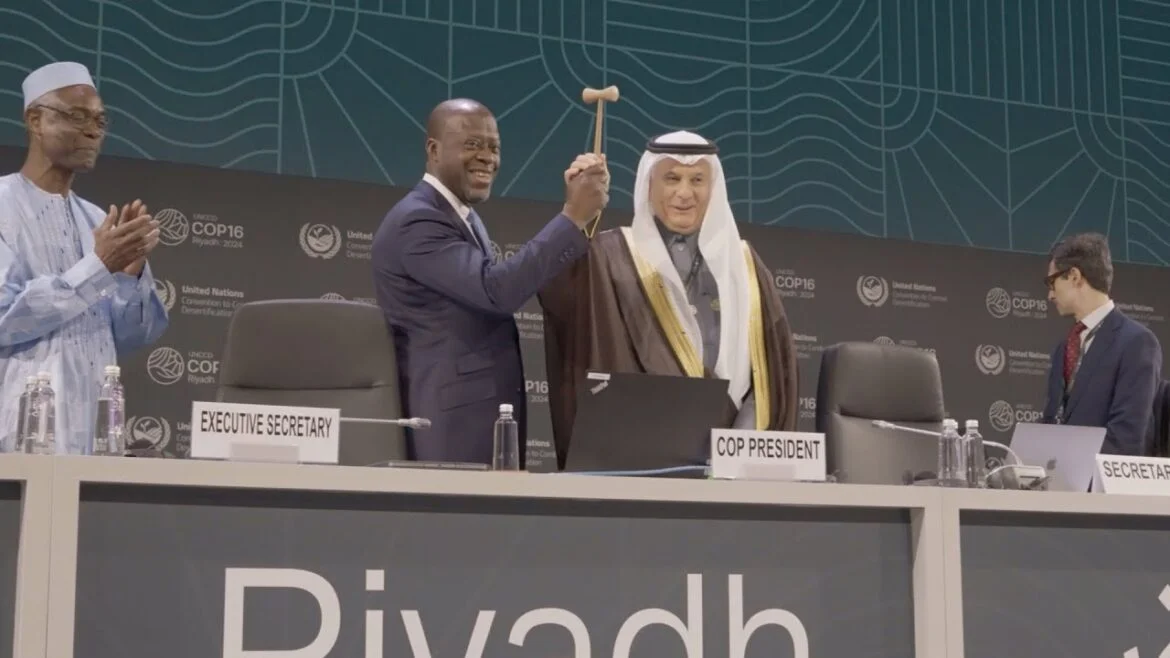Leaders from governments, the private sector, civil society and global stakeholders are meeting to accelerate progress on sustainable land management at the United Nations Convention to Combat Desertification (UNCCD) COP16, which is being hosted in Riyadh, Saudi Arabia.
COP16 is a critical moment for governments and non-state actors to slow and reverse land degradation, with hopes to halt the loss of fertile land globally, following the UNCCD COP 15 in Abidjan, Côte d’Ivoire in 2022. During COP15, 38 decisions highlighting the role of land sustainability in addressing multiple challenges were adopted through a unified global pledge to strengthen drought resilience and increase investment in land restoration and conservation for prosperity for all.
Established in 1994, the UNCCD is the only legally binding treaty – signed by 197 countries plus the European Union – linking environmental conservation and sustainable land management for development, promoting good governance to avoid, minimise and reverse land degradation, thus ensuring the continued availability of land-based natural resources that are essential for human survival.
Saudi Arabia Elected to Presidency of COP16
This year, the Kingdom of Saudi Arabia was officially elected as the President of the 16th Conference of the Parties (COP16) of the United Nations Convention to Combat Desertification (UNCCD), during the opening ceremony in Riyadh.
With this announcement, Saudi Arabia begins its two-year term to advance international action on land rehabilitation, restoration, fertility and resilience to desertification and drought.
During the official opening of the conference, COP16 President Abdulrahman bin Abdulmohsen Al-Fadhli urged the international community to take significant action to achieve the UNCCD’s goal of rehabilitating 1.5 billion hectares of land by 2030.
“We are at a critical juncture for the earth we live on and for all our people”, said Minister Al-Fadhli. “Restoring land fertility and strengthening our resilience to drought are essential to prevent many of the crises currently plaguing societies around the world.”
Global Partnership for Drought Resilience
The Riyadh Global Partnership for Drought Resilience is set to accelerate a shift in how drought challenges are addressed around the world. Drawing on the collective influence of major global institutions, drought response mechanisms will be radically transformed, and instead of an emergency response after a crisis has occurred, it will be addressed in a proactive approach, by strengthening early warning systems, financing, vulnerability assessments, and drought risk mitigation.
“The initiative will facilitate collaborative and coordinated joint action around the world and will serve as a ‘one-stop-shop’ to strengthen capacities and preparations to address drought challenges”, said Dr Osama Fakiha, Undersecretary of the Ministry of Environment, Water and Agriculture for Environmental Affairs, and Advisor to the COP Presidency.
“It will also play a very important role in supporting efforts to shift from emergency response, which is limited to providing aid and relief after a drought crisis, to pre-preparedness. At the same time, we endeavour to mobilise global resources to save lives and livelihoods around the world.”
The Partnership will also prioritise the launch of new drought financing mechanisms, as well as increased access to credit, equity financing, insurance products and grants, and Saudi Arabia will cover the expenses of the office for at least 10 years.
“While no country is immune to drought, 85 per cent of people affected by drought live in low-and-middle-income countries”, said Ibrahim Thiaw, Executive Secretary of the UNCCD. “In today’s interconnected world, we have a collective responsibility and common interest that requires the participation of everyone, everywhere, to address the catastrophic effects of drought, which spares no country.”
Droughts affect almost every corner of the globe affecting 1.84 billion people in 2022. More than 55 countries have been declared drought emergencies between 2020 and 2023, according to the UNCCD. In Africa, 28 per cent of the continent’s land area was affected by drought between 2016 and 2019, according to official reports. Latin America and the Caribbean saw similar devastation, with 37.9 per cent of land area affected during the same time period. Drought is the leading cause of food and water insecurity, and has displaced millions, with affected countries incurring huge economic losses.
Artificial Intelligence (AI)-Powered Observatory Launched to Combat Drought
The International Drought Observatory is the first global AI-powered platform dedicated to the proactive management of droughts. Projections from world-renounced research centres indicate that 75 per cent of the world’s population will be affected by severe droughts by 2050, unless swift and effective action is taken.
During the opening ceremony of the Observatory, the conference presidency called on the representatives of countries to provide data and expertise to enrich the work mechanisms of this project based on the latest AI technologies, in order to enhance the capabilities of countries and governments to confront drought.
The Observatory can be utilised to help stakeholders establish a foundation of press practices to protect communities, economies, and ecosystems, and work to continuously enhance them to reach the required sustainability.



